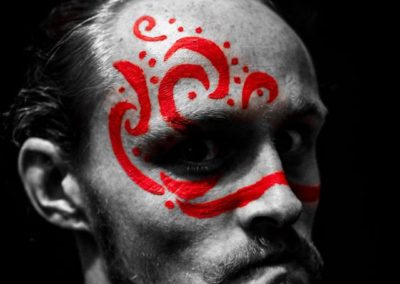Twelfth Night | MUSC
Melbourne University Shakespeare Company promised a Twelfth Night like none you’d experienced before, and its delivery is terrifying. Oscar Shaw’s immersive production twists the familiar comedy into a high-stakes thriller of madness and deceit that engulfs the audience into it’s re-imagined cultist world.
The isolation, lies and mind games of the original combine with an effective cut to bring the concept to life, with much of the dialogue taking on terrifying new meanings. But the moments without dialogue are equally strong, with the characters’ terror and malice seeming so real that minutes of action and passion can pass without the awareness that no one has spoken. As it twists and turns, the audience quickly realises that while familiar on the surface, no one is safe and nothing can be certain.
The familiar safety and comfort of being separate from the play is all but non-existent, leaving the audience to question whether they are compliant observers or the next victims
Alice Wheaton’s Viola is a survivor to the core, and in a play of deception, hers is a rarity in centering not on malice but in the safety of both herself and those she loves. Clever, quick-witted and brave, she acts as the audience’s eyes into the thrilling horror of the cult. Her relationship with Adelaide Greig’s Olivia is a moment of happiness and safety for them both that allows them thrive in the mayhem. Greig’s confident and calm portrayal masks her sheer terror to living at the whims of both the cult and those she trusts, yet she is able to build the mask into herself with a passionate bravery to defy even those in power.
Declan Mulcahy’s Orsino is deceptively mild mannered and cheerful in his role as cult-leader, yet maintains an aura of threat that hints at his controlling and violent nature. Lewis McLeod’s Malvolio is likewise restrained and seemingly level-headed, but it makes the realisation of his toxic entitlement dangerously real. In contrast, Anthony Kuiper’s Feste is a living nightmare, with an alien, almost puppet-like physicality that can make him appear possessed. His moments of darkness in the original script are heightened into a genuinely terrifying figure who feeds on the fear he spreads as he swoops through the scene like a demonic bird of prey.
Twelfth Night is contorted into a thrilling, nightmarish journey as disturbing as any tragedy
While Sir Toby, Maria, Sir Andrew and Fabian (Scout Boxall, Sara Tabitha Cathpole and Nicholas Kirkby) bring moments of welcome comic relief to the darkness, they also serve to further demonstrate how no one is immune from the cult’s sadistic grasp. While initially being clearly disturbed by Feste and uneasily loyal to Orsino, spite and self-preservation mutate into delighting themselves in others’ misery. They also form the basis of the ensemble that make up the cult of Twelfth Night. With a seventeen person cast pushing the bounds of student theatre, their eerie harmony creates a thrilling sense of danger to anyone outside their ranks. Prowling the dark lawns beyond the stage or peering through tents on the sidelines, they feed the air of paranoia and act with a unity that is both impressive and unsettling. While having slightly smaller roles, Owen Lane’s Sebastian and Rebecca Poynton’s Antonio show the horrors of anyone trying to escape the group. Antonio’s escape is a heart-pounding opening to the play, leading his petrified conflict and self-sacrifice to be completely gut-wrenching. And despite avoiding the cult for the longest time of any of the characters, Sebastian is dyed in their violent madness terrifyingly quickly.
The outdoor staging is a set in itself, with a looming tree serving as the heart of the performance. While the main performance area is well lit, the darkened lawn beyond allows the casts’ entrances and exits to be powerful moments in themselves, and leaves the audience constantly alert. The familiar safety and comfort of being separate from the play is all but non-existent, leaving the audience to question whether they are compliant observers or the next victims. And while Louis Stevens’ soundtrack can recreate all the terror of a thriller with ease, its most haunting moments come when it’s impossible to tell whether the thunder, whispers and howling wind are staged or real.
The cloth banners and tents are simple yet eerily create the cult camp, aided by an impressive array of props and effects. Similarly, Alexandra Turnbull’s varying face paint both ties the characters together and distinguishes them. Olivia and Orsino’s matching white clothing and gold makeup create misleading parallels, while Feste’s dark feathery mask causes him to appear almost inhuman. Yet it is Viola’s complete avoidance of the war paint that signals her unyielding nature even when at the very heart of the cult.
Twelfth Night is contorted into a thrilling, nightmarish journey as disturbing as any tragedy. But its comedic roots remain the source of its chills; catharsis is overruled by reigning chaos and madness that is impossible to escape.
Click here for Twelfth Night performance dates, ticketing prices and more information.






